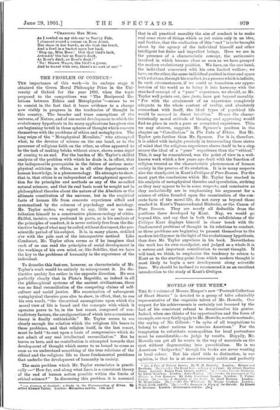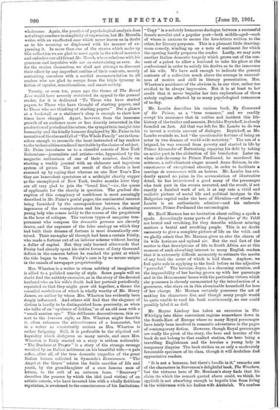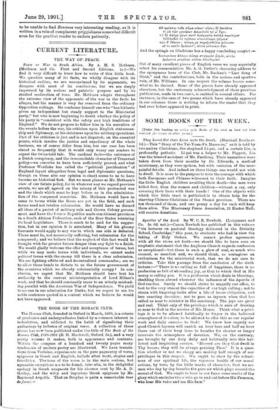NOVELS OF THE WEEK.*
THE fint volume of Messrs. Harper's new "Portrait Collection of Short Stories" is devoted to a group of tales admirably representative of the exquisite talent of Mr. Howells. Our respect for his achievements is certainly not lessened by the fact of his consistent refusal to denationalise his genius. Indeed, when one thinks of his opportunities and the force of example, one may fairly apply to Mr. Howells, mutatis mutanclis, the saying of Mr. Gilbert: "In spite of all temptations to belong to other nations he remains American." For the temptation to substitute cosmopolitan for local portraiture must be considerable,—to judge by results. Happily, Mr. Howells can get all he wants in the way of materials on the spot without degenerating into parochialism. He is no American " kailyarder," though his books are never wanting in local colour. But his chief title to distinction, in our opinion, is that he is at once extremely subtle and perfectly • (1.) A Pair of Patient Lovers. By W. D. Howells. London Harper and Brothers. [6s.]—(2.) The Bread Line : a Story of a Paper. By Albert Bigelow Paine. London Kegan Paul, Trench, and Co. 1.5s.]—(3.) Crucial Instances. By Edith Wharton. London John Murray. [le.]—(4.) By Command of the Prince: a True Romance. By John Lawrence Lambe. London : T. Fisher Unwin. [6s.]—(5.) A Daughter of the Veldt. By Basil Martian. London: W. Heinemann. (13.3.]—(13.) The Whirligig. By Mayne Lindsay. London: Ward, Lock, and Co. [Gs.] Bonanza: a Story of :he Outside. By Ernest Cl. Benham. London Hutchinson nnd Co. [8s.1
wholesome. Again, the practice of psychological analysis does not always conduce to simplicity of expression, but Mr. Howells writes with an unaffected ease which never leaves us in doubt as to his meaning or displeased with his manner of ex- pressing it. In more than one of the stories which make up this collection we are glad to meet again in the role of narrator and onlooker our old friend Mr. March, whose relations with his generous and impulsive wife are as entertaining as ever. As for the stories themselves, we shall not attempt to discount their effect by any imperfect outline of their contents, merely contenting ourselves with a cordial recommendation to all readers who are glad to escape from the triple tyranny in fiction of squalor, sensationalism, and smart society.
Twenty, or even ten, years ago the theme of The Bread Line would have severely restricted its appeal to the general reader, for it is dedicated "To Those who have started papers, to Those who have thought of starting papers, and to Those who are thinking of starting papers." But a glance at a bookstall or a stationer's shop is enough to show how times have changed. Apart, however, from the immense growth of an audience more or less directly interested in the production of periodical literature, the sympathWc insight into humanity and the kindly humour displayed by Mr. Paine in his narrative of the rise and fall of "The Whole Family" are in them- selves enough to reconcile the least instructed of lay readers to the technicalities rendered inevitable by the choice of subject. Mr. Paine introduces us to a cheerful coterie of New York Bohemians—journalists and artists—who, hypnotised by the magnetic enthusiasm of one of their number, decide on starting a weekly journal with an elaborate and ingenious system of prizes. The net result of their efforts is best summed up by saying that whereas on one New Year's Eve they are benevolent spectators at a midnight charity supper to the unemployed of New York, twelve months later they are all very glad to join the "bread line,"—i.e., the queue of applicants for the charity in question. The gradual dis- ruption of this conspiracy of confidence is most amusingly described in Mr. Paine's genial pages, the sentimental interest being furnished by the correspondence between the most ingenuous of the conspirators and his fiancée, a charming young lady who comes nobly to the rescue of the proprietors in the hour of collapse. The various types of sanguine tem- perament who compose the dramatis personm are cleverly drawn, and the exposure of the false analogy on which they had built their dreams of fortune is most dramatically con- trived. Their exemplar all through had been a certain Frisby, who made a fortune out of an inferior scheme without having a dollar of capital. Bat they only learned afterwards that Frisby had already spent his entire fortune of forty thousand dollars in the concern before he reached the point at which the tide began to turn. Frisby's case is by no means unique in the annals of newspaper proprietorship.
Mrs. Wharton is a writer in whom subtlety of imagination is allied to a polished suavity of style. Some people will no doubt find the subtlety excessive, as in the story of the devoted husband who on his wife's death had her portrait periodically repainted so that they might grow old together, a theme the essential morbidezza of which is wholly worthy of Mr. Henry James, an author by whom Mrs. Wharton has evidently been deeply influenced. And others will find that the elegance of diction is hardly to be distinguished from preciosity, as when she talks of an "opulence of dahlias," or of an old man with a "small saurian eye." This deliberate decorativeness, this re- sort to the bravura style, as Mrs. Wharton might describe it, often enhances the attractiveness of a humourist, but in a writer so consistently serious as Mrs. Wharton is rather fatiguing. Still, it is preferable to the slipshod col- loquiality which disfigures so many novels, and once Mrs. Wharton is fairly started on a story is seldom noticeable. "The Duchess at Prarer " is a story of the strange revenge wreaked by an Italian nobleman on his beautiful wife,—a pale reflex, after all, of the true domestic tragedies of the great Italian houses collected in Symonds's Renaissance. "The Angel at the Grave" relates the futile sacrifice of life and youth, by the granddaughter of a once famous man of letters, to the cult of an outworn fame. " Recovery " describes the process by which the idol (and victim) of an artistic coterie, who have invested him with a wholly fictitious reputation, is awakened to the consciousness of his limitations.
" Copy " is a sedately humorous duologue between a successful female novelist and a popular poet—both middle-aged—each of whom is anxious to secure the love-letters written to the other, for literary purposes. This is a pleasant little drawing- room comedy, winding up on a note of sentiment for which the opening hardly prepares the reader. Lastly, we may note another Italian domestic tragedy which grows out of the con- sent of a. priest to allow a husband to take his place at the confessional in order to satisfy his doubts as to the innocence of his wife. We have said enough to indicate the general contents of a collection much above the average in unusual- ness of motive and skill in literary presentation. Mrs. Wharton's avoidance of the obvious is, in our view, rather too studied to be always. impressive. But it is at least to her credit that it never beguiles her into explorations of thoce unholy regions affected by so many psychological romancers of to-day.
Mr. Lambe describes his curious book, By Command of the Prince, as a "true romance," and we readily accept his assurance that in outline and incident this life- history of the traitor and assassin, Detchko Boyteheff, is closely founded on fact. All that was left for Mr. Lambe to do was to invent a certain amount of dialogue. Boytcheff, as Mr. Lambe reminds us, had "the questionable fortune of being an actor in two dramas of world-wide notoriety." The son of a brigand, he was rescued from poverty and started in life by Prince Alexander of Battenberg, repaying his debt by taking an active part in the abduction of his benefactor. Later on, when aide-de-camp to Prince Ferdinand, he murdered his mistress, a cafe-chantant singer named Anna. Szimon, in cir- cumstances of exceptional atrocity, in order to facilitate a manage de convenance with an heiress. Mr. Lambe has evi- dently spared no pains in the accumulation of illustrative detail, he has interviewed a good many of the personages who took part in the events narrated, and the result, if not exactly a finished work of art, is at any rate a vivid and realistic picture of social life and political intrigue in the Bulgarian capital under the hero of Slivnitza—of whom Mr. Lambe is an enthusiastic admirer—and his unheroic successor, Prince Ferdinand the entomologist.
Mr. Basil Marnan has no hesitation about calling a spade a spade. Accordingly many parts of A Daughter of the Veldt are brutal and revolting, for they describe without mincing matters a brutal and revolting people. This is no doubt necessary to give a complete picture of life on the veldt, and we gladly admit that Mr. Marnan gives us also the charm of its wide horizons and upland air. But the real fact of the matter is that descriptions of life in South Africa are at this moment of such absorbing interest to many English readers that it is extremely difficult accurately to estimate the merits of any book the scene of which is laid there. Anyhow, we feel quite safe in applying to the book before us the adjective "powerful." The heroine, Joyce, is a charming creation, and the impossibility of her having grown up with her parentage and in the Heissmaams' house with the particular virtues which she possesses is cleverly surmounted by the introduction of a governess, who stays on in this abominable household for love of her charge. Mr. Marnan certainly possesses the art of making his characters live, and though many people would be quite unable to read his book continuously, no one could possibly label it as dull.
Mr. Mayne Lindsay has taken an excursion in The Whirligig into thiase convenient regions somewhere down in the South-East of Europe where so many Royal personages have lately been involved in romantic adventures in the pages of contemporary fiction. However, though Royal personages are really the pivot of the story, the hero and heroine of the book do not belong to that exalted station, the hero being a travelling Englishman and the heroine a young lady in temporary disguise The book strikes us as only a moderately favourable specimen of its class, though it will doubtless find appreciative readers.
"It is not a bonanza, but there's boodle in it" remarks one of the characters in Stevenson's delightful book, The Wreckers, but the virtuous hero of Mr. Henham's story finds that his claim (to which the remark quoted above could, we think, be applied) is not absorbing enough to beguile him from living in the wilderness with his Indian wife Akehelah. We confess
to be unable to find Bonanza very interesting reading, as it is written in a vein of complacent priggishness somewhat difficult even for the gentlest reader to endure patiently.






















































 Previous page
Previous page